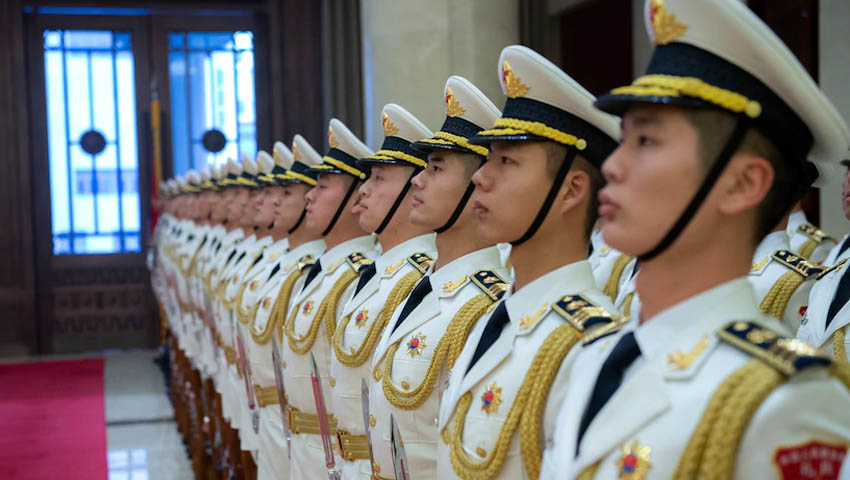Does China pose a genuine military threat to Australia or have “hawkish” observers exaggerated tensions?
Australia-China relations are perhaps at a record low, with real, substantive dialogue between Canberra and Beijing seemingly suspended.
Prime Minister Scott Morrison’s unrelenting criticism of the Chinese Communist Party’s (CCP) policy actions both domestically and abroad caught the ire of President Xi Jinping, who published a list of 14 grievances with Australia, which include:
- the decision to ban Huawei from rolling-out 5G technology in Australia;
- the introduction of foreign interference laws, perceived as targeting China;
- calls for an inquiry into the origins of the COVID-19 pandemic;
- criticism of CCP behaviour in the South China Sea;
- vocal condemnation of human rights abuses in Xinjiang, Hong Kong, and Taiwan;
- accusations against China regarding state-sponsored cyber attacks; and
- the introduction of new foreign relations laws enabling the federal government to veto state or local government agreements with foreign governments.
In addition to suspending formal diplomatic relations with Canberra, Beijing has imposed trade bans and economic sanctions on Australian imports in an attempt to coerce Australia into subservience.
But the Morrison government has stood firm, buoyed by public support for a strong stance against CCP aggression.
According to Sam Roggeveen, director, international security program at the Lowy Institute, Australia’s resilience is evidence of the limits of Chinese power.
“Rather than backing down under pressure, Australia has further stiffened its policies since these trade measures were put in place,” he writes.
“China’s reputation has also been damaged, and our economy has passed through the storm. In fact, we survived a much greater economic test in the form of COVID-19, and so far, our economy has shown itself to be remarkably resilient.
“The lesson Beijing should take is that it is difficult to coerce Australia economically because we are well protected from even deep shocks.”
But some fear tensions between Canberra and Beijing may extend beyond verbal jousting and trade weaponisation.
Roggeveen dispels such concerns, claiming China is incapable of forging a sustained military campaign against Australia.
“Just as there are limits on the economic pain China can inflict on Australia, so it is with military force,” he continues.
Roggeveen acknowledges China has made “enormous strides” in the defence space, noting the People’s Liberation Army’s “stunning” technological progress.
However, he suspects these advancements fall short of overcoming geographical obstacles.
“Since the end of World War II, the world has seen nothing like the speed and quality of modernisation that we see in China’s naval, air, space and cyber forces,” Roggeveen continues.
“Yet, China has not overcome the limits of physics and engineering. The longer the distance over which a nation wants to project military power, the more difficult and expensive it becomes.
“Australia’s China hawks are apt to forget that over 4,000 kilometres separates Darwin from China’s southern fleet headquarters in Zhanjiang.”
He concedes China’s new artificial islands in the South China Sea and its long-range ballistic and cruise missiles can hit targets in northern Australia “with enormous accuracy” but adds such missiles can only carry a single high-explosive warhead or many smaller sub-munitions.
“It’s a hugely costly way to deliver not very much force,” Roggeveen contends.
“For sustained military operations, China would need either military bases much closer to Australia, which is a distant prospect, or it would need to sail a fleet towards our shores.”
Australia should assume China’s navy would eventually develop more capable long-range power projection forces, he writes, but geography would continue to hinder a prospective threat.
“To sustain military operations over such vast seas requires enormous resources,” Roggeveen notes.
“China could sail its two aircraft carriers toward Australia, plus many escorting destroyers and submarines, but it couldn’t keep such ships replenished and ready to fight indefinitely, and it couldn’t replace them if they needed repair.”
Roggeveen observes that China would neglect other security threats in the event of a full-scale attack against Australia.
“[It’s] hard to think of circumstances in which China would devote all its key naval resources to a fight with Australia,” he adds.
“Everywhere China looks around Asia, its ambitions are constrained by other great powers: India, Russia, Japan, and the United States.
“Its relations with those powers will never be stable and friendly enough for it to ignore them as security threats in order to focus its military power on far-away Australia.”
He concludes: “Granted, Australia’s security problems will get harder as China grows. But it remains a manageable problem, especially if Australia continues to get bigger also.
“A growing population is good for Australia in many ways, but it is also a key determinant of Australia’s ability to manage the risks of a more powerful China.”
Get involved with the discussion and let us know your thoughts on Australia’s future role and position in the Indo-Pacific region and what you would like to see from Australia's political leaders in terms of partisan and bipartisan agenda setting in the comments section below, or get in touch with



